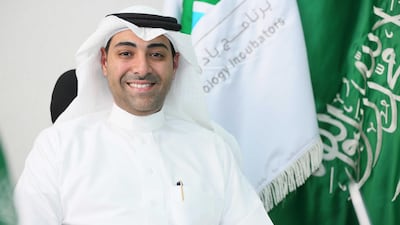Business Incubators and Accelerators Company (Biac), owned by Saudi Arabia's sovereign wealth fund, is expanding operations across the Arabian Gulf next year, its chief executive said.
The company is also looking to eventually spread into global markets.
"Our business strategy is simple, we will expand in all countries that speak both Arabic and English. In the first phase, we will enter Oman in 2020… steadily covering all GCC nations," Nawaf Al Sahhaf, chief executive of Biac, told The National.
“[The eventual] global expansion will automatically open new avenues… our target is to raise at least 25 per cent more venture capital for start-ups every year.”
Established in 2016 through a royal decree, Biac has raised almost Dh328 million in venture capital for more than 650 start-ups incubated as of the second quarter of this year. It is a subsidiary of Saudi Technology Development and Investment Company, which is fully-owned by the kingdom's Public Investment Fund.
Saudi Arabia is one of the fastest-growing start-up and venture capital markets in the Middle East and North Africa, with total funding climbing 82 per cent year-on-year in the first six months, according to a Magnitt report released last month.
A total of $40m (Dh146.8m) was invested in start-ups based in the kingdom during the period. It was ranked third in Mena after the UAE and Egypt, where start-ups secured $311m and $53mm, respectively.
Mr Sahhaf said Biac's second phase of expansion will focus on the broader Middle East and beyond.
“We will operate through channel partners and invest significant capital in new global markets,” Mr Sahhaf said. Investments will be “huge but differ case by case”, he said declining to specify the size of investments.
Biac has contributed about Dh2.06 billion to the kingdom’s economy through the incubated start-ups and has created more than 2,053 jobs in the last two years, he added.
The company, which operates in 10 cities in Saudi Arabia, also aims to remove red tape to attract foreign start-ups to the kingdom.
Biac is working with the Saudi Arabian General Investment Authority (Sagia), a government body tasked with boosting foreign investment, on a soft-landing programme to help foreign companies to start businesses in the kingdom in less than two weeks.
“[A] few things that we consider include [a foreign company] team’s potential, skills and ability to compete globally and scale up the business,” said Mr Sahhaf.
The kingdom, Opec's biggest oil producer which still relies heavily on the sale of hydrocarbons for revenue, is trying to develop its non-oil economy. Broadening the industrial base and the development of its small and medium-sized enterprises, especially start-ups, is part of the government's Vision 2030 economic plan. Riyadh aims to raise the contribution of SMEs to gross domestic product to 35 per cent in 2030, from 20 per cent currently.
To help the government achieve its agenda, Biac is running an Innovation Centre for Industry 4.0 initiative that provides start-ups with access to new technologies to improve business, Mr Sahhaf said.
“We see huge scope in the sectors of biotechnology, agri-tech and artificial intelligence. Depending on the business idea, we link start-ups with potential investors and venture capital firms,” he said.
Besides supporting start-ups, Biac is also focusing on establishing and managing business incubators and accelerators. Most start-ups are either based in the capital Riyadh, its commercial hub, Jeddah, or in the city of Dammam in the oil-rich Eastern Province.
“Other cities will also pick up with the opening of Saudi economy. An open ecosystem will ensure easy availability of knowledge and talent,” he said.


